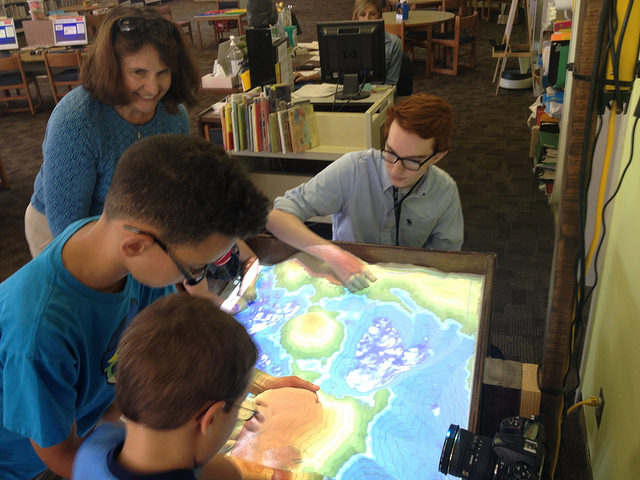
Lessons in sharing, from the public library
Knight News Challenge: Libraries offers applicants a chance to share in $2.5 million by focusing on the question “How might we leverage libraries as a platform to build more knowledgeable communities?” Below, Nate Hill deputy director of the Chattanooga, Tenn., Public Library, writes about the communities and the social contract embodied in libraries.
This morning, for perhaps the 46th time, I read my toddler son a book called “Mine-o-saur.” In the story, the Mino-o-saur learns that he needs to share his toys with other dinosaurs to make friends. When he was alone with all of the toys, he was sad, and the community of other dinosaurs moved on and had fun with different toys elsewhere. My son stared intently at the book, and you could see the gears in his little head turning… “I better not act like the Mine-o-saur; I like having friends!”
RELATED LINKS
“Why Libraries?” by Sheila Murphy on Knight blog (9/17/14)
“Libraries cultivate connections, community and more in the digital age” by Anthony Marx on Knight blog (9/15/14)
“Can research libraries adapt to live up to their potential?” by Bernard Reilly on Knight blog (9/12/14) “Finding the sweet spot for libraries in the digital age” by Jill Bourne on Knight Blog (9/11/14)
“Knight News Challenge: Libraries opens for entries” by John Bracken on Knight Blog (9/10/14)
“Why Libraries [Still] Matter” by Jonathan Zittrain on Medium (9/10/14)
“News Challenge to explore role of libraries in the digital age” by John Bracken on Knight Blog (8/25/14)
“Knight News Challenge on Libraries offers $2.5 million for innovative ideas ” – Press Release (8/10/14)
Sharing is an essential part of healthy social interactions, and our culture knows and values this so highly that we begin conditioning children to understand it from a very early age. A community, defined as a unified body of individuals, isn’t much of a community without some kind of sharing system, including access rules, behavioral modes and a resulting social contract. In early cultures, people lived collectively and shared child care and food preparation duties. Now, communities might share playful things, such as toys, as the Mine-o-saur learned, or they may share crucial infrastructure, such as a plumbing system or an electrical grid. They can share space, water, food, knowledge, books or livestock. They might share a network connection, computers or other devices.
At their core, libraries are sharing systems. They are an agreement that a community makes to pool some kind of resource, create access rules and then share access to that resource. We think of books as the primary resource at libraries, but that is changing. Right now, libraries are offering access to media, files, hammers, space, people, land, guitars, connectivity and mobile devices, just to name a few.
It is useful to recognize that sharing systems are an inevitable function of communities, because the broadly implemented version of public libraries is currently threatened and endangered. We need to reframe the problem: If libraries are an inevitable function of community, then we have a collective responsibility to make them useful, efficient and reflective of what needs to be shared in their communities. If we can accept the Internet as a disruptive force in the production, publishing and distribution of media, then we can move on to intentionally design useful and usable sharing systems and learning interactions that account for this. The possibilities are almost endless.
It is the endlessness of potential public library implementations that makes this Knight News Challenge challenge so exciting. This broad, interdisciplinary call for proposals will yield a diversity of ideas and approaches. Apply early, and apply often!
To submit an entry or provide feedback on other submissions, visit newschallenge.org. You can join us for virtual office hours from 1 to 2 p.m. ET Sept. 23. Participants can access the meeting online (https://bluejeans.com/731675489/browser using ID 731675489), or participate via phone at 1-888-240-2560. Knight News Challenge: Libraries closes at 5 p.m. ET on Sept. 30. Winners will be announced in January.
Recent Content
-
Journalismarticle ·
-
Journalismarticle ·
-
Journalismarticle ·


